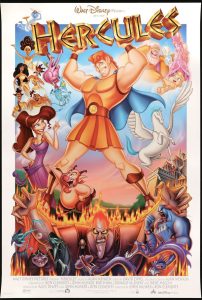 “Hercules is a cartoon, a big cartoon!” This is how master animator Eric Goldberg described Disney’s take on the Greek God in a 1997 interview.
“Hercules is a cartoon, a big cartoon!” This is how master animator Eric Goldberg described Disney’s take on the Greek God in a 1997 interview.
And that is, indeed, the sensibility behind the studio’s 35th animated feature, from co-directors Ron Clements and John Musker. They brought their irreverent touch from Aladdin to this film and even kicked it up a notch.
“We call it an epic comedy,” said producer Alice Dewey in 1997. “So, that pretty much sums it up.”
Musker and Clements came across the idea for Hercules as a feature in 1993 when they reviewed several projects in the early days of development, and saw artwork from animator Joe Haidar, who had initially pitched the idea.
The directors were both intrigued by the possibilities of Greek mythology, and giving it a different spin..
“It is definitely an epic,” said co-director Ron Clements of Hercules in 1997. “It has this ‘bigness’ to it. But, throughout the movie, we’re pulling together the ‘bigness’ with ‘light-heartedness,’ and it’s an interesting combination. There’s a comedic element that runs through the film, even in some of its most serious moments.”
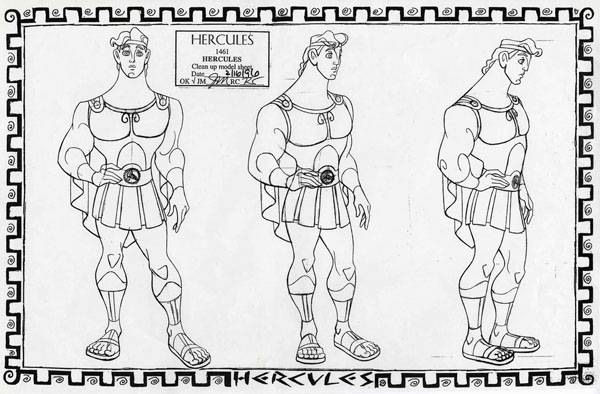
Disney’s Hercules would begin on Mount Olympus, with the Gods Zeus and Hera welcoming their son, Hercules. The Lord of the Underworld, Hades, arrives at the welcome party for Hercules. He is secretly planning a “hostile takeover” of Mount Olympus.
The villain learns that, in eighteen years, he can take over Zeus’ territory, but his one obstacle will be Hercules. He concocts a plan and dispatches his sidekicks, Pain, and Panic, to Mount Olympus to kidnap Hercules, administer a potent “Grecian formula,” which would render him mortal, and then dispose of the baby on Earth. The two dimwits fail to give Hercules all the potion, which leaves the babe on Earth human, with God-like strength, and raised by a mortal couple. He learns of his origins and that the only way he can return to his father, Zeus and Mount Olympus is to prove himself a true hero on Earth.
 He seeks help from the satyr Philoctetes (Phil), a hero trainer, and meets Meg, a tough, resourceful woman unlike any he has ever met before (who is also working for Hades).
He seeks help from the satyr Philoctetes (Phil), a hero trainer, and meets Meg, a tough, resourceful woman unlike any he has ever met before (who is also working for Hades).
As he eventually squares off against Hades to save both Earth and Mount Olympus, Hercules becomes a celebrity, thanks to his God-like strength.
Although based on Greek mythology, the film reflected many modern-day sensibilities. Everything from Nike, American Express, and the Disney company’s own successful retail organization, The Disney Store, is parodied.
Additionally, Hercules made very sharp, comedic comments on marketing, promotion, and celebrity status.
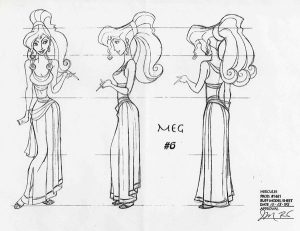 The movie did all this, not just with its distinct tone but its look. Co-director Musker is a big fan of artist Gerald Scarfe, a cartoonist, and illustrator most famous for the disturbing artwork created for Pink Floyd: The Wall, the 1979 album, and the 1982 movie, and wanted to merge Scarfe’s sensibilities with that of the Disney style.
The movie did all this, not just with its distinct tone but its look. Co-director Musker is a big fan of artist Gerald Scarfe, a cartoonist, and illustrator most famous for the disturbing artwork created for Pink Floyd: The Wall, the 1979 album, and the 1982 movie, and wanted to merge Scarfe’s sensibilities with that of the Disney style.
Scarfe was brought to the Disney studio and created early conceptual artwork and character design that heavily influenced the look of Hercules, giving the film its bold graphic appearance.
“Once we saw what he did, we were really stimulated by that,” said co-director Musker in 1997, “and we kept encouraging him to do more. We tried to have his pen point touch all the characters in the film.”
 Adding to the differentiators in Hercules was a very distinct voice cast: Tate Donovan brought innocence to the main character (animated by Andreas Deja), and Susan Egan (the original Belle in Disney’s Broadway version of Beauty and the Beast) was perfect as the hard-boiled, yet conflicted Meg (animated by Ken Duncan) and Danny DeVito was in full “Louie DePalma from Taxi” mode as Phil (the character was also a hysterical caricature of DeVito, animated by Eric Goldberg).
Adding to the differentiators in Hercules was a very distinct voice cast: Tate Donovan brought innocence to the main character (animated by Andreas Deja), and Susan Egan (the original Belle in Disney’s Broadway version of Beauty and the Beast) was perfect as the hard-boiled, yet conflicted Meg (animated by Ken Duncan) and Danny DeVito was in full “Louie DePalma from Taxi” mode as Phil (the character was also a hysterical caricature of DeVito, animated by Eric Goldberg).
As Hades, actor James Woods brought to the screen one of Disney’s most distinctive villains. A change from the “above-it-all,” highbrow villains like Frollo in Hunchback or Ratcliffe in Pocahontas, Hades was more of a fast-talking schmoozer, and the character, crafted by animator Nik Ranieri, is a wonder to behold when he’s on-screen.
The rest of the Hercules cast included Rip Torn as Zeus, Samantha Eggar as Hera, Bobcat Goldthwait, and Matt Frewer as Pain and Panic, with Charlton Heston as the film’s opening narrator.
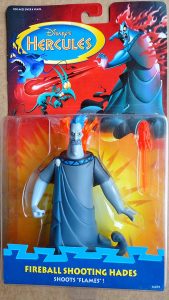 Adding to the more contemporary tone of Hercules were the songs by Alan Menken and David Zippel. Most of them (including the infectious showstopper, “Zero to Hero”) are performed by the wonderful Muses, a combination of a Greek chorus and a stellar Motown group.
Adding to the more contemporary tone of Hercules were the songs by Alan Menken and David Zippel. Most of them (including the infectious showstopper, “Zero to Hero”) are performed by the wonderful Muses, a combination of a Greek chorus and a stellar Motown group.
Last summer marked the 25th anniversary of Hercules, which was released with the same event-type marketing that is, ironically, lampooned in the film. Not only were there enough toys, t-shirts, and fast-food campaigns connected with Hercules to fill several summer movie seasons, but Disney also partnered with New York City to stage a parade through the streets of Manhattan to promote the film. On June 14, 1997, “Disney’s Hercules Electrical Parade” marched up Fifth Avenue with light-up floats from Disney’s theme park “Main Street Electrical Parade,” including newly designed Hercules-themed floats.
Critics enjoyed the film’s uber-irreverence, and while Hercules did well at the box office, its final take fell short of projections.
But, two and a half decades later, like several films of the 90s that have benefitted from home video re-visits, many have come to appreciate and recognize Hercules for its unique style and its always meaningful message, as Hercules tries to find an answer to the question of what defines a hero.
“In the movie, we spend a lot of time trying to define that,” said producer Dewey. “Is it fame? Is it fortune? Is it wealth? Is it notoriety? Is it good deeds? What is it to be a hero? It’s the lesson that he learns in the end.”


 Michael Lyons is a freelance writer, specializing in film, television, and pop culture. He is the author of the book, Drawn to Greatness: Disney’s Animation Renaissance, which chronicles the amazing growth at the Disney animation studio in the 1990s. In addition to Animation Scoop and Cartoon Research, he has contributed to Remind Magazine, Cinefantastique, Animation World Network and Disney Magazine. He also writes a blog, Screen Saver: A Retro Review of TV Shows and Movies of Yesteryear and his interviews with a number of animation legends have been featured in several volumes of the books, Walt’s People. You can visit Michael’s web site Words From Lyons at:
Michael Lyons is a freelance writer, specializing in film, television, and pop culture. He is the author of the book, Drawn to Greatness: Disney’s Animation Renaissance, which chronicles the amazing growth at the Disney animation studio in the 1990s. In addition to Animation Scoop and Cartoon Research, he has contributed to Remind Magazine, Cinefantastique, Animation World Network and Disney Magazine. He also writes a blog, Screen Saver: A Retro Review of TV Shows and Movies of Yesteryear and his interviews with a number of animation legends have been featured in several volumes of the books, Walt’s People. You can visit Michael’s web site Words From Lyons at: 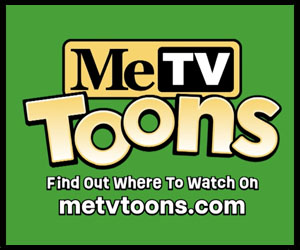












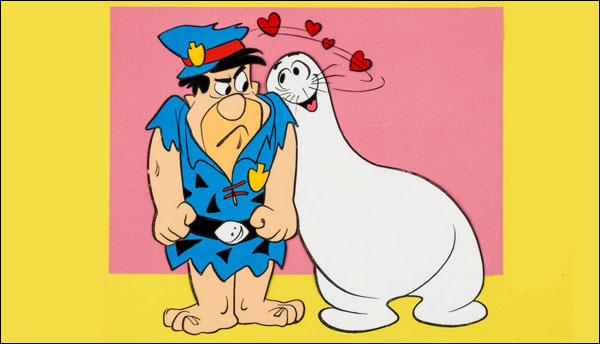
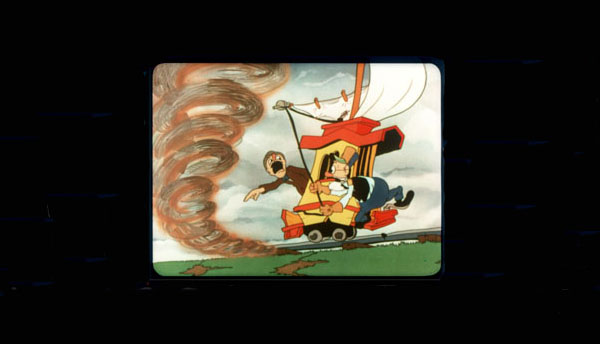








The “very sharp comedic comments” in “Hercules” are by no means limited to our modern obsessions with celebrity status and popular culture. For us lovers of Greek mythology — an enduring interest spawned in my case by the Trans-Lux “The Mighty Hercules” cartoons in early childhood — the film is densely packed with clever allusions, not only to the Hercules myth but also so those of Perseus and Theseus, as well as the Iliad and Odyssey. The writers clearly knew and respected the source material just as they were having fun with it, and thereby made it fun for the audience as well.
Some elements in the film — the designs of Zeus and Pegasus, and the establishing shot of Mount Olympus — are reminiscent of the Pastoral Symphony segment of Disney’s Fantasia.
I’ve always liked Matt Frewer, a very funny and talented guy who I think could have been as big a star as Robin Williams if he had the right breaks. I’ve always held the opposite opinion of Bobcat Goldthwaite, possessor of by far the most annoying voice in the entire history of show business. He makes Gilbert Gottfried sound like a BBC radio announcer.
As a kid, I was already familiar with Bobcat as he had already did some animation voiceover work including Cartoon Network’s first original animated character, the CGI dog Moxie.
The A-list comedian I have most frequently seen Frewer compared to is Jim Carrey. Ironically or appropriately, depending on how you look at it, he would provide the voice of one of the animated version of one of Carrey’s character in Hanna Barbera’s Dumb and Dumber show, one of three cartoons based on Jim Carrey movies on air at the time.
I believe Goldthwait’s famous voice (as heard in the Police Academy movies etc.) is/was an affect, and in recent years he has increasingly used his normal voice.
Disney had previously taken on Greek Mythology in “The Pastoral Symphony” from Fantasia to the accompaniment of music by Beethoven. There was also a Donald Duck short “Trombone Troubles” which included Duck versions of the Greek/Roman gods under the names Jupiter and Vulcan. But even given these prior excursions, “Hercules” was the most extensive exploration of the classical world by Disney artists.
It is also one of the most self-conscious, meta-cognitive efforts produced by the studio. The message from the start of the film is–this source material is too dignified and pretentious for a serious take, so we’re going to jazz it up for you. In some ways this works against the film. It is hard to empathize with a character when we’re told at the outset not to take any of it seriously. Then the barrage of gags when Hercules is at the peak of his popularity, parodying various aspects of the Disney marketing machine is clever–hilarious, even–but yet it undermines whatever nuggets of story are trying to get us to empathize with our hero. The Muses are a delightful touch–but they do keep pulling the audience out of the story with their backstage perspective. Not that I find any of this distasteful. I enjoy this film, I really do. But this tug-of-war between telling a “straight” story and telling a “hip, modern” version causes the film, in my opinion, to lack heart.
I would be remiss not to mention the more recent development of the character of “Storkules” in the cast of the new “Duck Tales” series as a friend for Donald. I don’t think there’s much of a connection between this character and Hercules, aside from similar origins. But it underscores the storytelling potential that still exists in these ancient myths. And now that I think of it, the original “Duck Tales” series also often delved into the world of classical Greek and Roman myth in episodes such as “Home Sweet Homer.” “The Golden Fleecing”, “Raiders of the Lost Harp” and “A Duck Tales Valentine”. Proving the richness of the source material.
Honestly, I thought the film was good as is. It’s a favorite of the Maltins, too, as mentioned on their livestreams.
I always theorize that the choice to have Scarfe do the designs was the more the result of Disney trying to elbow-in on Nickelodeon’s turf as the network in the 90s was pretty much advertised as “ Disney but for MTV obsessed little boys” and was eating there lunch with that demo at the time. I know they claim they were inspired by Greek urns but the fact that the imps Pain and Panic are clearly modeled after Ren and Stimpy and the “Too gross for Disney” moments like the Hydra getting disemboweled by Herc, the Fates nasty eyeball and the entire Thebes scene and the general “griminess” of Scarfes style sort of make me wonder.
I didn’t know Scarfe was involved with this movie until over a decade after I first saw it on VHS. His concept art, while gorgeous, would’ve been difficult to translate into animation, but the final designs do stay faithful to his concepts while still being toyetic enough to work on the silver screen.
Incidentally, I recall seeing footage of Scarfe in some BBC special where he talked about Disney’s influence on him as a kid, followed by a clip from his short film “Long Drawn Out Trip” where Mickey Mouse take a long hit off a joint.
Other than the sizes, I don’t see much resemblance between the imps and the cat and dog team.
I’ve never seen it, but I’m a Charlton Heston fan, so might as well.
Heston’s narration only occupies the first 30 seconds of the movie. It’s worth seeing in full.
Anyone for a Mighty Hercules (actually Superman in a toga) vs. [Disney] Hercules match? A mock reality show where they compete on the 12 Labors? Wait till Helena meets Meg, Newton meets Phil, and Daedalus meets Hades. Olympia!
2 comments, if I may….
Though I acknowledge that this site is primarily concerned with the art, history, production, and people behind works like this, I find it interesting, and perhaps a bit presumptuous that Disney planned “Hercules'” premiere in Greece, but it was declined by the government when the film was panned in Greece as “another case of foreigners distorting our history and culture just to suit their commercial interests.” – –
https://news.google.com/newspapers?id=_WIvAAAAIBAJ&sjid=EjIDAAAAIBAJ&pg=2326%2C3065721
And, although I wasn’t crazy about Gerald Scarfe’s production design, I must acknowledge Ellen Woodbury and her associates’ fine work in making “Pegasus” absolutely gorgeous, stylish, and amusing! (I HAD to mention this since I love to follow and document horse characters in animation!)
“Hercules” was definitely a fun movie, though, and I have strong feelings of nostalgia for it. (It was exciting to run it, along with many other animated films, while I was a theater projectionist between 1987 and 2012!)
Thank you!
The extensive promotional events in New York alluded to in the article were by no means universally welcomed with open arms either, representing as they did a rather literal embodiment of the so-called “Disneyfication” of the city that was underway at the time.
I don’t think CR is particularly replete with (Retro) Gamers, or even former gamers, but I’d like to mention that the PS1 tie-in game for Hercules (awkwardly called Disney’s Action Game Featuring Hercules) is something of a hidden gem. It’s closer to the previous generation Disney games like Mickey Mania and Aladdin (and like those games utilises new hand-drawn animation) than the 3D platformers that were in vogue at the time, so reviews weren’t particularly enthusiastic at the time, but I think it’s aged better than many of its contemporaries.